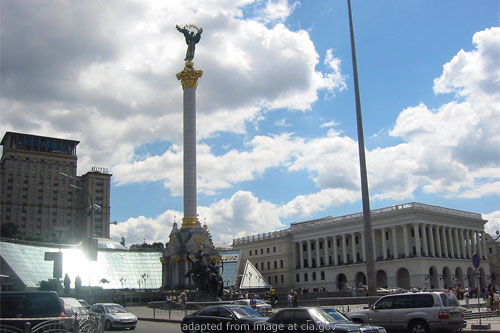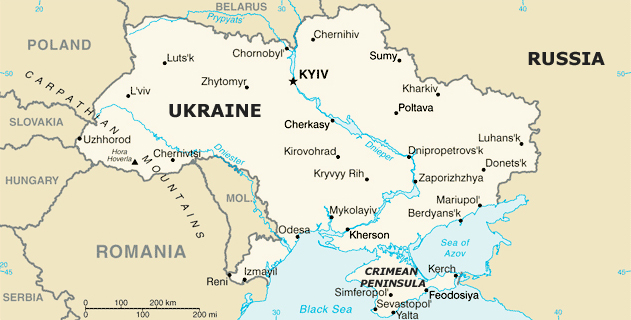Ukraine talks restart, second Minsk summit on cards

(Business New Europe – bne.eu – MOSCOW BLOG: Ben Aris in Moscow – December 8, 2014) After many had written off Europe’s attempts to find a peaceful way out of the Ukrainian imbroglio following the chilly G20 summit in Brisbane on December 1, the talks got a new impetus on December 6 when French President Francois Hollande made an impromptu stop-over in Moscow to meet Russian President Vladimir Putin.
The talks led to a flurry of activity in Ukraine and the US over the weekend that may end with a second Minsk summit being held, possibly in the coming week.
Seen as a rare display of goodwill, Hollande’s meeting with Putin, held in the VIP hall at Moscow airport, was actually an attempt to revive the talks, which hit a brick wall in Australia.
As bne wrote in a recent blog, talks have reached an impasse: Europe, lead by German Chancellor Angela Merkel, refuses to withdraw sanctions until there is a real peace in Ukraine, not just the nominal ceasefire, which presumably includes the complete withdrawal of Russian troops and materiel. Putin, for his part, refuses to pull back his support for pro-Russian separatists in the eastern regions of Ukraine until he has a “100% guarantee” that Ukraine will not join Nato. The lack of trust and the belligerent rhetoric means neither side is willing to back down.
Merkel’s strident comments during a speech given to students at an Australian university the day after the G20 summit were taken as a signal that German was pulling back from its long running friendship with Russia. However, Merkel herself said no such thing in the speech, but expressed her frustration with the situation. Hollande’s stop-over in Moscow on his way back from neighbouring Kazakhstan – the first visit to Russia by a European leader since Russia annexed the Crimea in March – was an attempt to find a way out of the diplomatic cul-de-sac.
According to French newspaper Le Figaro, the meeting was only confirmed at the last minute and organised with the help of Kazakh President Nursultan Nazarbayev, who has only offered the Kremlin lukewarm backing for his showdown with the West and flatly refused to impose sanctions on either European or Ukrainian goods being imported into the other countries of the Custom Union, the Russian-led free trade area. The Kazakhs also want to see an end to the standoff that is also hurting their economy, which is highly dependent on Russia’s.
For their part, the Russians have signalled they would like to bring the fight to an end – if their key demands for a neutral Ukraine are met. Putin again was in a cooperative move, according to reports.
“I very much hope that in the near future we will have a final ceasefire agreement” in east Ukraine, Putin said in televised remarks after meeting with Hollande, reported the Moscow Times. Without a fully implemented truce, he said, “it is difficult to picture Ukraine as a territorially integral country, and Russia, as is well-known, supports the territorial integrity of Ukraine.”
Hollande added that “de-escalation of the Ukrainian crisis is possible”, if the ceasefire agreement, agreed to by both sides in Minsk in September, is fully implemented. “France wants this crisis to end because it is causing suffering, for Ukrainians and because of the sanctions, and because it prevents relations with Russia from proceeding as they should.”
To emphasis the movement of talks on solving the Ukrainian issue and the fact nothing can happen until that is solved, the two presidents said they didn’t talk about the stalled delivery of the Mistral warship that has become caught up in the row.
Ukrainian President Petro Poroshenko said on his Twitter account that he had also been briefed by Hollande by phone on his talks with Putin. He also announced on December 6 that the Kyiv government would meet with rebel leaders in Minsk on December 9 to discuss how to better implement the ceasefire agreement.
It seems that diplomatic efforts are moving towards a second Minsk summit soon – possibly on December 12 according to some reports – to attempt to re-establish the ceasefire and continue work on finding a compromise between Russia’s demand for Ukraine’s neutrality and Kyiv’s desire to move closer to Europe.
Poroshenko also talked to US Secretary of State John Kerry at the weekend and agreed that a new meeting of the Trilateral Contract Group on Ukraine in Minsk will give a fresh impetus to the previous agreement signed on September 5, reported TASS.
“Petro Poroshenko said the Trilateral Contact Group should gather for a meeting the soonest possible to solve pressing humanitarian problems of people living in Donbass, such as deliveries of foodstuffs, medicines, supplies of heat and energy,” the US press service said.

